American Pastoral 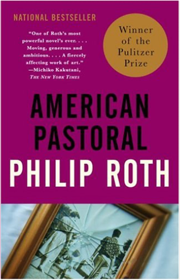 Everyman 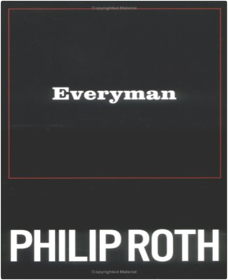 The fate of Roth's everyman is traced from his first shocking confrontation with death on the idyllic beaches of his childhood summers, through the family trials and professional achievements of his vigorous adulthood, and into his old age, when he is rended by observing the deterioration of his contemporaries and stalked by his own physical woes. A successful commercial artist with a New York ad agency, he is the father of two sons from a first marriage who despise him and a daughter from a second marriage who adores him. He is the beloved brother of a good man whose physical well-being comes to arouse his bitter envy, and he is the lonely ex-husband of three very different women with whom he's made a mess of marriage. In the end he is a man who has become what he does not want to be. The terrain of this powerful novel — Roth's twenty-seventh book and the fifth to be published in the twenty-first century — is the human body. Its subject is the common experience that terrifies us all. Everyman takes its title from an anonymous fifteenth-century allegorical play, a classic of early English drama, whose theme is the summoning of the living to death. Exit Ghost 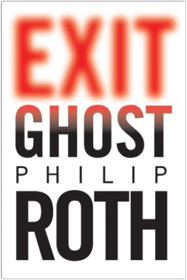 The Humbling 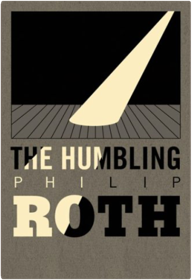 Into this shattering account of inexplicable and terrifying self-evacuation bursts a counterplot of unusual erotic desire, a consolation for a bereft life so risky and aberrant that it points not toward comfort and gratification but to a yet darker and more shocking end. In this long day’s journey into night, told with Roth’s inimitable urgency, bravura, and gravity, all the ways that we convince ourselves of our solidity, all our life’s performances—talent, love, sex, hope, energy, reputation—are stripped off. The Humbling is Roth’s thirtieth book. Indignation 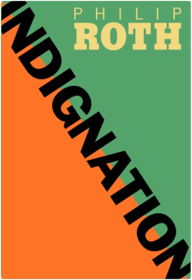 It is 1951 in America, the second year of the Korean War. A studious, law-abiding, intense youngster from Newark, New Jersey, Marcus Messner, is beginning his sophomore year on the pastoral, conservative campus of Ohio's Winesburg College. And why is he there and not at the local college in Newark where he originally enrolled? Because his father, the sturdy, hard-working neighborhood butcher, seems to have gone mad — mad with fear and apprehension of the dangers of adult life, the dangers of the world, the dangers he sees in every corner for his beloved boy. As the long-suffering, desperately harassed mother tells her son, the father's fear arises from love and pride. Perhaps, but it produces too much anger in Marcus for him to endure living with his parents any longer. He leaves them and, far from Newark, in the midwestern college, has to find his way amid the customs and constrictions of another American world. Indignation, Philip Roth's twenty-ninth book, is a story of inexperience, foolishness, intellectual resistance, sexual discovery, courage, and error. It is a story told with all the inventive energy and wit Roth has at his command, at once a startling departure from the haunted narratives of old age and experience in his recent books and a powerful addition to his investigations of the impact of American history on the life of the vulnerable individual. My Life As a Man (Vintage International) 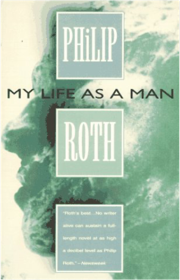 At its heart lies the marriage of Peter and Maureen Tarnopol, a gifted young writer and the woman who wants to be his muse but who instead is his nemesis. Their union is based on fraud and shored up by moral blackmail, but it is so perversely durable that, long after Maureen's death, Peter is still trying—and failing—to write his way free of it. Out of desperate inventions and cauterizing truths, acts of weakness, tenderheartedness, and shocking cruelty, Philip Roth creates a work worthy of Strindberg—a fierce tragedy of sexual need and blindness. Nemesis 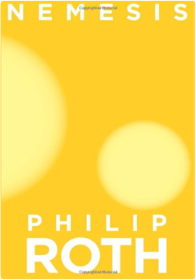 At the center of Nemesis is a vigorous, dutiful twenty-three-year-old playground director, Bucky Cantor, a javelin thrower and weightlifter, who is devoted to his charges and disappointed with himself because his weak eyes have excluded him from serving in the war alongside his contemporaries. Focusing on Cantor’s dilemmas as polio begins to ravage his playground—and on the everyday realities he faces—Roth leads us through every inch of emotion such a pestilence can breed: the fear, the panic, the anger, the bewilderment, the suffering, and the pain. Moving between the smoldering, malodorous streets of besieged Newark and Indian Hill, a pristine children’s summer camp high in the Poconos—whose "mountain air was purified of all contaminants"—Roth depicts a decent, energetic man with the best intentions struggling in his own private war against the epidemic. Roth is tenderly exact at every point about Cantor’s passage into personal disaster, and no less exact about the condition of childhood. Through this story runs the dark questions that haunt all four of Roth’s late short novels, Everyman, Indignation, The Humbling, and now Nemesis: What kind of accidental choices fatally shape a life? How does the individual withstand the onslaught of circumstance? Operation Shylock : A Confession (Vintage International) 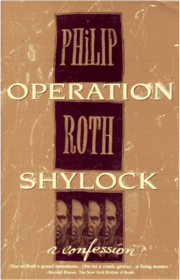 Philip Roth: Nemeses: Everyman / Indignation / The Humbling / Nemesis 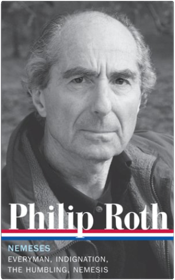 Philip Roth: Novels 1967-1972: When She Was Good / Portnoy's Complaint / Our Gang / The Breast 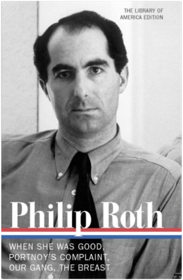 When She Was Good (1967) is the trenchant portrait of Lucy Nelson, a young midwestern woman whose perception of her own suffering turns her into a ferocious force, "enemy-ridden and unforgivingly defiant," as Roth would later describe her. A small-town 1940s America of restrictive social pressures and foreclosed opportunities provides the novel's background. The publication of the hilarious Portnoy's Complaint (1969) was a cultural event that turned Roth into a reluctant celebrity. The confession of a bewildered psychoanalytic patient thrust through life by his unappeasable sexuality yet held back by the iron grip of his unforgettable childhood, Portnoy unleashed Roth's comic virtuosity and opened new avenues for American fiction. In Our Gang (1971), described by Anthony Burgess as a "brilliant satire in the real Swift tradition," Roth effects a savage takedown of the administration of Richard Nixon (who figures here as Trick E. Dixon). Written before the revelations of the Watergate scandal, Our Gang continues to resonate as a broad and outraged response to the clownish hypocrisy and moral theatrics of the American political scene. The Kafkaesque excursion The Breast (1972) introduces David Kepesh in the first volume of a trilogy that continues with The Professor of Desire (1977) and The Dying Animal (2001). The Breast prompted Cynthia Ozick to remark, "One knows when one is reading something that will permanently enter the culture." Philip Roth: Novels 1973-1977, The Great American Novel, My Life as a Man, The Professor of Desire 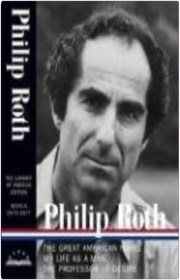 Philip Roth: Novels 1993-1995: Operation Shylock / Sabbath's Theater 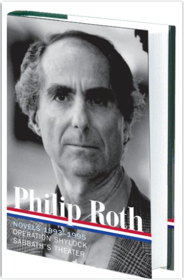 "This splendidly wicked book" is how the critic Frank Kermode described Sabbath's Theater (1995), a comic masterpiece of epic proportions whose gargantuan hero, Mickey Sabbath, grieving the loss of his unsurpassable mistress, embarks on a turbulent journey into his past besieged by the ghosts of those who loved and hated him most. Philip Roth: Novels 2001-2007: The Dying Animal / The Plot Against America / Exit Ghost 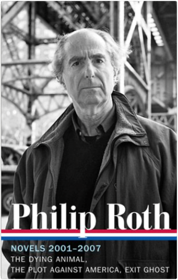 Philip Roth: Novels and Other Narratives 1986-1991 / The Counterlife / The Facts / Deception / Patrimony 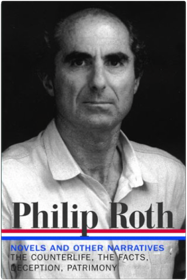 This fifth volume of The Library of America?s definitive edition of Philip Roth?s collected works presents four books that exemplify the description of Roth, proposed by British novelist Anthony Burgess, as a writer ?who never steps twice into the same river.? The Counterlife (1986) is a novel told from conflicting perspectives about people enacting drastic dreams of renewal and escape. The Facts (1988)?the first of the ?Roth Books??is a novelist?s autobiography in which the author presents his own battles defictionalized and unadorned. In the second Roth book, Deception (1990), a married American named Philip, living in London, and the married Englishwoman who is his mistress meet sporadically in a secret trysting place where the woman eloquently reveals herself to her lover as they talk before and after making love. In the third Roth book, Patrimony (1991), the author watches as his 86-year-old father, Herman Roth, battles a fatal brain tumor. Philip Roth: Novels and Stories 1959-1962: Goodbye, Columbus & Five Short Stories / Letting Go 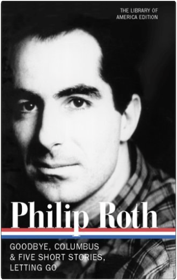 The title novella, Goodbye, Columbus, the story of a summer romance between a poor young man from Newark and a rich Radcliffe co-ed, is both a tightly wrought tale of youthful desire and a satiric gem that takes aim at the comfortable affluence of the postwar boom. Here and in the stories that accompany it, including "The Conversion of the Jews" and "Defender of the Faith," Roth depicts Jewish lives in 1950s America with an unflinching sharpness of observation. In Letting Go, a sprawling novel set largely against the backdrop of Chicago in the 1950s, Roth portrays the moral dilemmas of young people cast precipitously into adulthood, and in the process describes a skein of social and family responsibilities as they are brought into focus by issues of marriage, abortion, adoption, friendship, and career. The novel's expansiveness provides a wide scope for Roth's gift for vivid characterization, and in his protagonist Gabe Wallach he creates a nuanced portrait of a responsive young academic whose sense of morality draws him into the ordeals of others with unforeseen consequences. Philip Roth: The American Trilogy 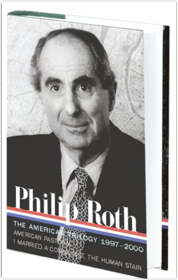 Philip Roth is the only living novelist whose works are being collected in the Library of America series. The nine-volume edition will be completed in 2013, for Roth's 80th birthday. Philip Roth: Why Write? Collected Nonfiction 1960-2013 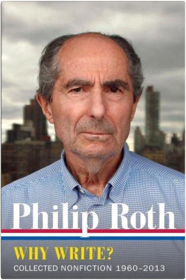 Throughout a unparalleled literary career that includes two National Book Awards (Goodbye, Columbus, 1959 and Sabbath’s Theater, 1995), the Pulitzer Prize in fiction (American Pastoral, 1997), the National Book Critics Circle Award (The Counterlife, 1986), and the National Humanities Medal (awarded by President Obama in 2011), among many other honors, Philip Roth has produced an extraordinary body of nonfiction writing on a wide range of topics: his own work and that of the writers he admires, the creative process, and the state of American culture. This work is collected for the first time in Why Write?, the tenth and final volume in the Library of America’s definitive Philip Roth edition. Here is Roth’s selection of the indispensable core of Reading Myself and Others, the entirety of the 2001 book Shop Talk, and “Explanations,” a collection of fourteen later pieces brought together here for the first time, six never before published. Among the essays gathered are “My Uchronia,” an account of the genesis of The Plot Against America, a novel grounded in the insight that “all the assurances are provisional, even here in a two-hundred-year-old democracy”; “Errata,” the unabridged version of the “Open Letter to Wikipedia” published on The New Yorker’s website in 2012 to counter the online encyclopedia’s egregious errors about his life and work; and “The Ruthless Intimacy of Fiction,” a speech delivered on the occasion of his eightieth birthday that celebrates the “refractory way of living” of Sabbath’s Theater’s Mickey Sabbath. Also included are two lengthy interviews given after Roth’s retirement, which take stock of a lifetime of work. Sabbath's Theater 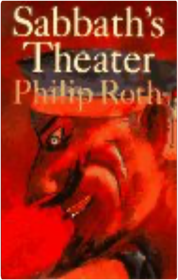 The Human Stain: A Novel 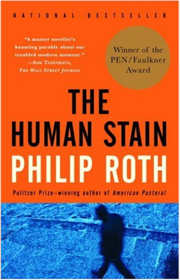 Coleman Silk has a secret, one which has been kept for fifty years from his wife, his four children, his colleagues, and his friends, including the writer Nathan Zuckerman. It is Zuckerman who stumbles upon Silk's secret and sets out to reconstruct the unknown biography of this eminent, upright man, esteemed as an educator for nearly all his life, and to understand how this ingeniously contrived life came unraveled. And to understand also how Silk's astonishing private history is, in the words of The Wall Street Journal, "magnificently" interwoven with "the larger public history of modern America." The Plot Against America : A Novel 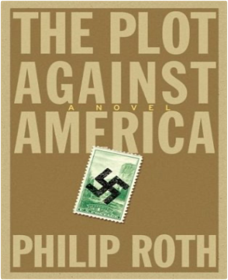 A. Lindbergh defeated Franklin Roosevelt by a landslide in the 1940 presidential election, fear invaded every Jewish household in America. Not only had Lindbergh, in a nationwide radio address, publicly blamed the Jews for selfishly pushing America toward a pointless war with Nazi Germany, but upon taking office as the thirty-third president of the United States, he negotiated a cordial "understanding" with Adolf Hitler, whose conquest of Europe and virulent anti-Semitic policies he appeared to accept without difficulty. What then followed in America is the historical setting for this startling new book by Pulitzer Prize–winner Philip Roth, who recounts what it was like for his Newark family — and for a million such families all over the country — during the menacing years of the Lindbergh presidency, when American citizens who happened to be Jews had every reason to expect the worst. The Professor of Desire 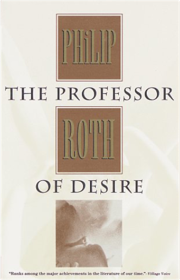 Zuckerman Bound: A Trilogy and Epilogue 1979-1985: The Ghost Writer / Zuckerman Unbound / The Anatomy Lesson / The Prague Orgy 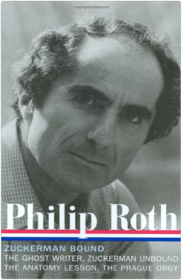 This fourth volume presents the trilogy and epilogue that constitute Zuckerman Bound (1985), Roth's wholly original investigation into the unforeseen consequences of art-mainly in libertarian America and then, by contrast, in Soviet-suppressed Eastern Europe-during the latter half of the twentieth century. The Ghost Writer (1979) introduces Nathan Zuckerman in the 1950s, a budding writer infatuated with the Great Books, discovering the contradictory claims of literature and experience while an overnight guest in the secluded New England farmhouse of his literary idol, E. I. Lonoff. Zuckerman Unbound (1981) finds him far from Lonoff's domain-the scene is Manhattan as the sensationalizing 1960s are coming to an end. Zuckerman, in his mid-thirties, is suffering the immediate aftershock of literary celebrity. The high-minded prot?g? of E. I. Lonoff has become a notorious superstar. The Anatomy Lesson (1984) takes place largely in the hospital isolation ward that Zuckerman has made of his Upper East Side apartment. It is Watergate time, 1973, and to Zuckerman the only other American who seems to be in as much trouble as himself is Richard Nixon. Zuckerman, at forty, is beset with crippling and unexplained physical pain; he wonders if the cause might not be his own inflammatory work. In The Prague Orgy (1985), entries from Zuckerman's notebooks describing his 1976 sojourn among the outcast artists of Soviet-occupied Czechoslovakia reveal the major theme of Zuckerman Bound from a new perspective that provides the stinging conclusion to this richly ironic and intricately designed magnum opus. As an added feature, this volume publishes for the first time Roth's unproduced television screenplay for The Prague Orgy, featuring new characters and scenes that do not appear in the novella. |


Delicious Library
Collection Total:
3,640 Items
3,640 Items
Last Updated:
Nov 2, 2025
Nov 2, 2025


 Made with Delicious Library
Made with Delicious Library